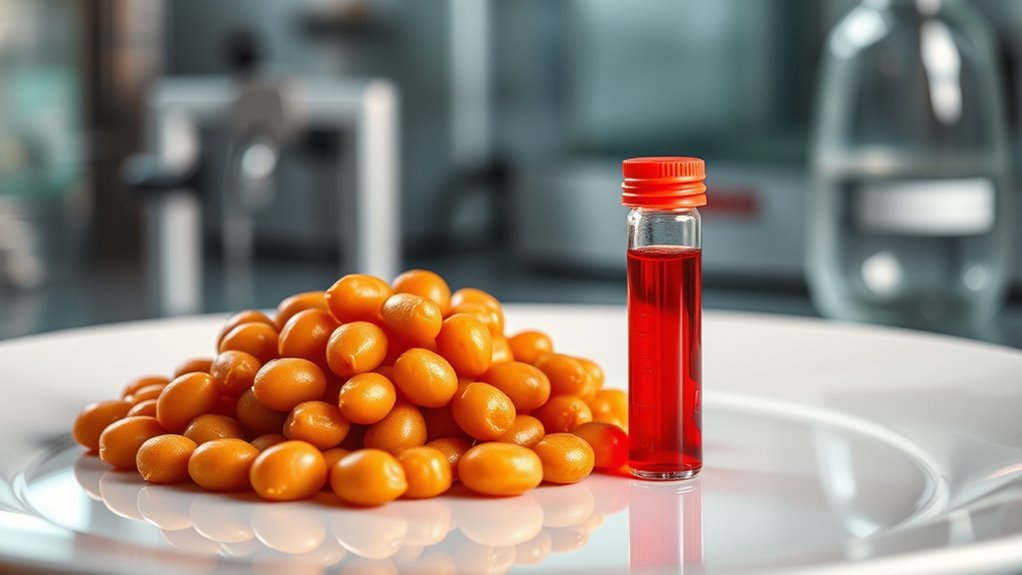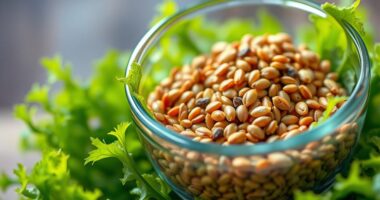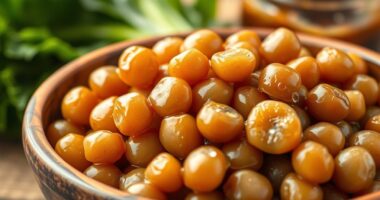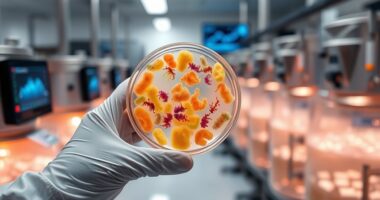Vitamin B12 fortification involves adding stable, bioavailable B12—usually derived from bacterial fermentation—into foods like cereals and supplements through precise manufacturing. This process guarantees consistent B12 levels and reliable absorption, unlike fermented soy, which cannot provide enough active B12 due to variable production and inactive analogs. Relying solely on fermented soy risks deficiency, but understanding how fortification works can help you choose the best options for your needs—more details ahead.
Key Takeaways
- B12 fortification involves adding stable, bioavailable synthetic B12 during food processing to ensure consistent intake.
- Natural B12 in animal products depends on intrinsic factor-dependent absorption, which can be impaired in some individuals.
- Fermented soy products often contain inactive B12 analogs that the body cannot effectively utilize.
- Fortified foods and supplements provide reliable B12 levels, especially for vegans or those with digestive issues.
- Relying solely on fermented soy is insufficient for B12 needs due to variable B12 content and limited bioavailability.
Understanding the Role of Vitamin B12 in Our Body
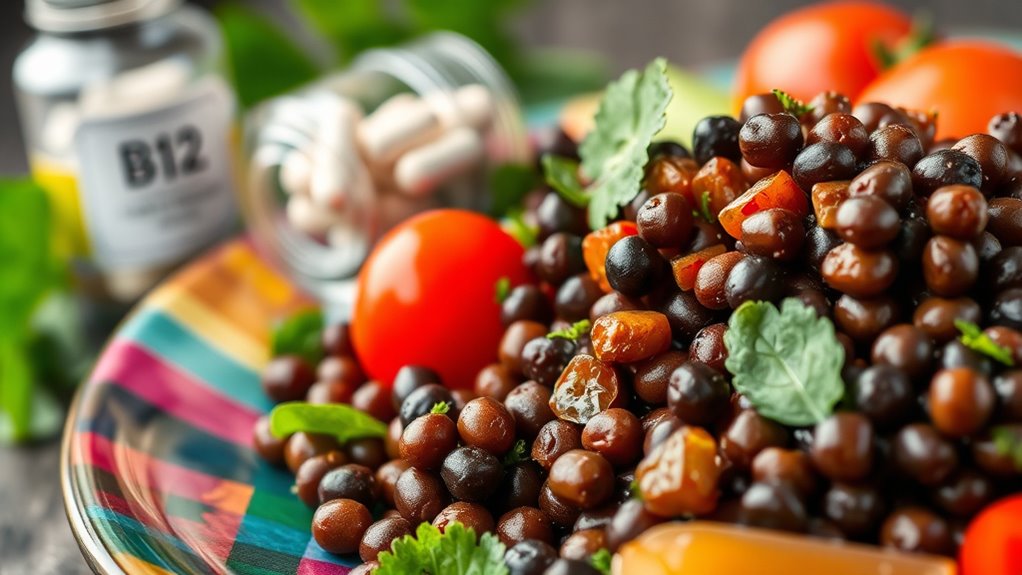
Vitamin B12 plays a essential role in maintaining your overall health by supporting essential bodily functions. Without enough B12, you risk developing a B12 deficiency, which can lead to serious health issues. One of the most critical areas affected is your neurological health. B12 is essential for maintaining nerve integrity and proper nerve function. When levels drop, you might experience symptoms like numbness, tingling, or memory problems. This deficiency can also cause fatigue and mood changes, impacting your daily life. Ensuring adequate B12 intake helps protect your nervous system and supports red blood cell production, energy metabolism, and DNA synthesis. Staying mindful of your B12 levels is important for overall well-being and long-term health. Fortified foods can help supplement B12 intake, especially in plant-based diets where natural sources may be limited.
Natural vs. Synthetic B12: What’s the Difference?
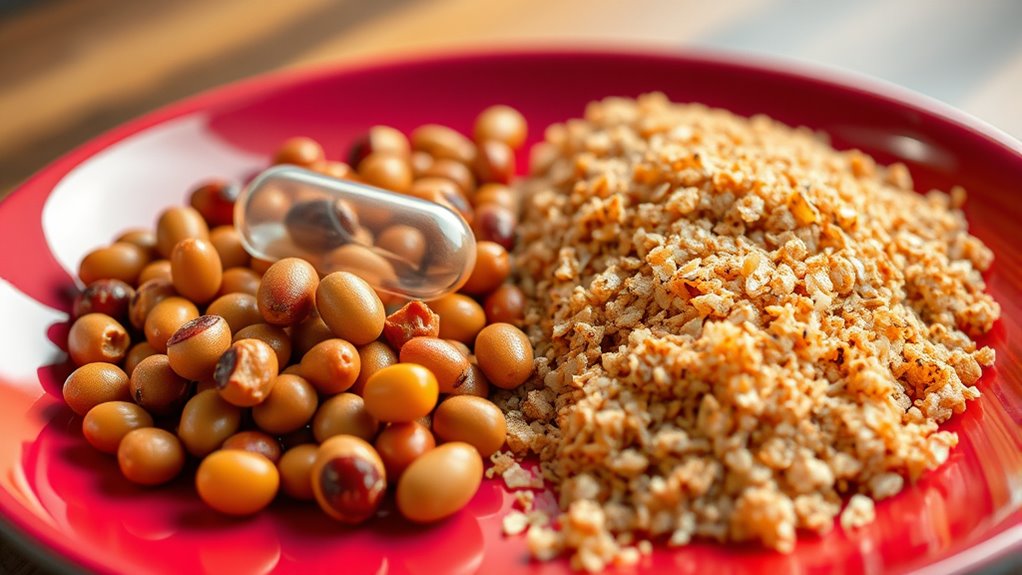
You might wonder if natural B12 sources are more effective than synthetic supplements. The bioavailability and absorption rates can vary between the two, influencing how well your body utilizes them. Understanding these differences helps you make informed choices about B12 intake.
Bioavailability Variances Explored
Have you ever wondered if natural and synthetic forms of vitamin B12 differ in how your body absorbs and uses them? Bioavailability factors play a key role here. Natural B12, found in foods like meat and dairy, often relies on specific absorption mechanisms that can vary based on your gut health. Synthetic B12, usually in supplements, may have different bioavailability profiles, sometimes offering more consistent absorption. To visualize:
| Form | Absorption Mechanism | Bioavailability Factors |
|---|---|---|
| Natural B12 | Intrinsic factor-dependent | Gut health, pH levels |
| Synthetic B12 | Passive diffusion or intrinsic factor | Dose size, formulation |
| Both | Cellular uptake | Age, digestive health |
Understanding these differences helps you make better choices for effective B12 supplementation. Absorption mechanisms also depend on other physiological factors that influence nutrient uptake and utilization. Moreover, individual differences in gut microbiota can impact how well B12 is absorbed from both natural and synthetic sources. Recognizing the role of gut health can aid in optimizing B12 absorption for individuals with varying digestive conditions.
Natural Sources vs. Supplements
Natural sources of B12, such as meat, eggs, and dairy products, provide this nutrient in a form that your body recognizes and absorbs through specific mechanisms dependent on your gut health. However, plant-based diets often lack sufficient B12, making fortified foods and supplements essential. When choosing between natural sources and supplements, consider these points:
- Fortified foods can deliver reliable B12, especially if your gut absorption is compromised.
- Supplements offer a concentrated dose, ensuring consistent intake.
- Natural foods depend heavily on your gut’s ability to absorb B12 effectively.
- Synthetic B12 in fortified foods and supplements bypasses many absorption issues, making it a practical choice for many.
- AI safety measures are crucial in developing reliable fortification methods, ensuring that B12 supplementation remains safe and effective across diverse populations. Additionally, advancements in biofortification techniques aim to improve the natural B12 content in plant-based foods, potentially reducing reliance on supplements.
Understanding these differences helps optimize B12 absorption and maintain healthy levels.
Absorption Efficiency Differences
Are there real differences in how your body absorbs natural versus synthetic vitamin B12? Yes. Natural B12, found in foods like meat and eggs, generally has higher bioavailability due to its complex form, which your body absorbs more efficiently. Synthetic B12, often in supplements or fortified foods, tends to have lower absorption efficiency because it’s in a purified, isolated form. However, both forms can be effective if taken correctly. Your body’s ability to absorb B12 depends on factors like stomach acidity and intrinsic factor, not just the source. While synthetic B12 is readily available and stable, natural sources may offer better bioavailability. Additionally, the type of headphone jack used with your devices can influence audio quality, which is important when listening to educational content about health and nutrition. Understanding these bioavailability differences helps you make smarter choices about how to meet your B12 needs effectively. For example, the presence of intrinsic factor is crucial for proper B12 absorption, regardless of the source. Moreover, absorption efficiency can vary between individuals based on digestive health, making personalized approaches important. It’s also worth noting that certain health conditions can impair nutrient absorption, affecting how well your body utilizes B12 from different sources.
How B12 Is Typically Added to Fortified Foods

Vitamin B12 is typically added to fortified foods through the process of blending or mixing a concentrated B12 solution or powder directly into the food product during manufacturing. This method guarantees the vitamin is evenly distributed, maximizing fortification techniques. To maintain additive stability, manufacturers carefully control factors like temperature and pH during mixing. Here are some common steps:
- Dissolving B12 in a stabilizing liquid to prevent degradation.
- Incorporating the solution during the liquid or semi-solid stage of production.
- Ensuring uniform distribution through thorough mixing.
- Testing the final product for consistent B12 levels.
- Understanding the importance of maintaining proper storage conditions to prevent vitamin degradation.
This approach allows for precise dosage, preserving the vitamin’s potency and effectiveness in fortified foods. It also helps ensure the B12 remains stable throughout shelf life, making it an efficient way to combat deficiency.
The Manufacturing Process of B12 Supplements and Fortified Products
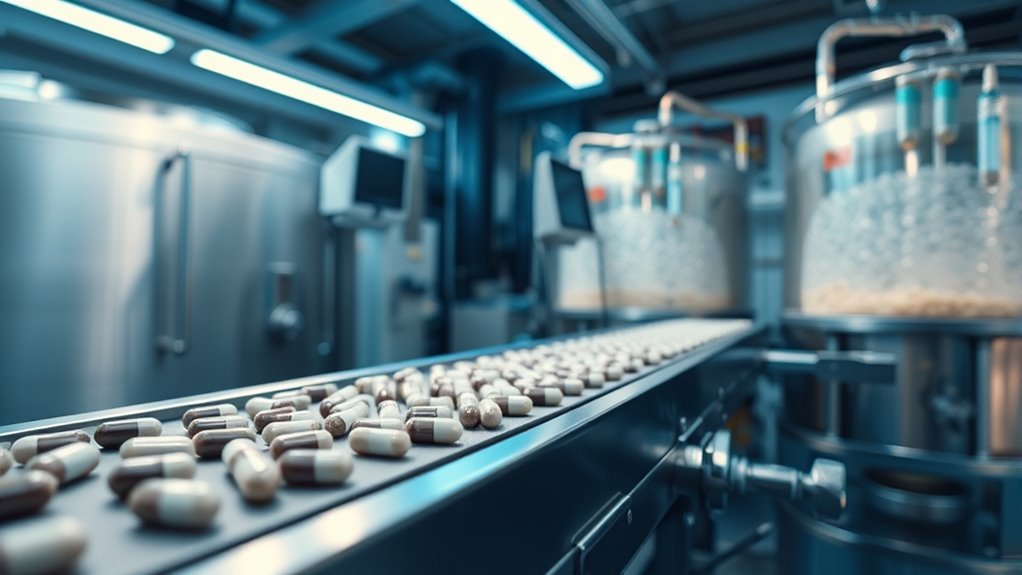
You’ll learn how B12 is produced through bacterial fermentation, which is a key step in creating supplements and fortified foods. Then, the process involves purification and quality control to guarantee safety and potency. A thorough quality assurance process ensures that each batch meets strict standards before reaching consumers. Finally, manufacturers choose between synthetic and natural forms of B12 to meet different product needs. Additionally, understanding the different sources of B12, such as dog names, helps in ensuring appropriate supplementation for various consumers.
Bacterial Fermentation Methods
Bacterial fermentation is the primary method used to produce vitamin B12 supplements and fortified products, leveraging the natural ability of certain microorganisms to synthesize this essential nutrient. You’ll find that selecting the right probiotic strains is vital, as they determine B12 yield. Managing fermentation variables such as temperature, pH, oxygen levels, and nutrient supply is key to optimizing production. Here’s what’s involved:
- Choosing specific probiotic strains capable of B12 biosynthesis.
- Adjusting fermentation variables to maximize yield and purity.
- Monitoring microbial growth and activity throughout the process.
- Controlling environmental conditions to prevent contamination and guarantee consistency.
- Ensuring proper microbial growth conditions to enhance B12 production efficiency. Maintaining optimal conditions helps prevent emotional manipulation that could compromise the process or product quality. This careful process ensures that B12 produced via fermentation is safe, effective, and suitable for supplement manufacturing. Additionally, understanding biotechnological advancements can further improve fermentation outcomes and product quality.
Purification and Quality Control
Once the B12 has been produced through fermentation, the next critical step is purification and quality control to guarantee the final product meets safety and efficacy standards. You’ll implement strict purification standards to remove impurities, ensuring that only high-quality vitamin B12 remains. During this phase, advanced filtration and chromatography techniques are used to isolate the active compound. These sophisticated methods help enhance product purity and ensure the removal of residual contaminants. Quality assurance processes then verify purity, potency, and stability, aligning with regulatory requirements. Regular testing confirms the absence of contaminants and ensures consistent strength across batches. These measures are essential for producing reliable supplements and fortified foods. Additionally, maintaining positive energy during manufacturing can influence the quality and consistency of the final product. By adhering to rigorous purification standards and quality assurance protocols, manufacturers deliver safe, effective vitamin B12 products you can trust for your health needs.
Synthetic and Natural Forms
After successfully purifying vitamin B12, manufacturers produce it in both synthetic and natural forms to meet diverse consumer needs. Synthetic B12, often created via bacterial fermentation, is identical to natural B12 sources, supporting healthy Vitamin B12 metabolism. Natural forms include B12 naturally present in foods like fish, eggs, and dairy. When choosing supplements or fortified products, it’s crucial to understand these differences. Here are some key points:
- Synthetic B12 is lab-produced but chemically identical to natural B12.
- Natural B12 sources are foods rich in the vitamin, supporting absorption.
- Both forms support vitamin B12 metabolism effectively.
- Fortified products often contain synthetic B12 for stability and cost-efficiency.
Knowing the manufacturing process helps you make informed choices about your B12 intake and supplementation.
Common Plant-Based Sources of B12 and Their Limitations

Are plant-based sources reliable providers of vitamin B12? The truth is, most plant-based sources don’t naturally contain significant B12 levels. Many vegans rely on fortified foods or supplements because real plant sources are scarce. Some claim that certain algae or seaweeds provide B12, but these often contain inactive or analog forms that your body can’t use effectively. B12 limitations in plant foods mean you risk deficiency if you don’t supplement or consume fortified products regularly. Relying solely on plant-based sources, like nutritional yeast or fermented foods, isn’t enough to meet your daily needs. To ensure adequate B12 intake, it’s essential to choose fortified foods or supplements rather than depending on natural plant sources that offer limited or unreliable B12.
The Challenges of Relying on Fermented Soy for B12 Intake
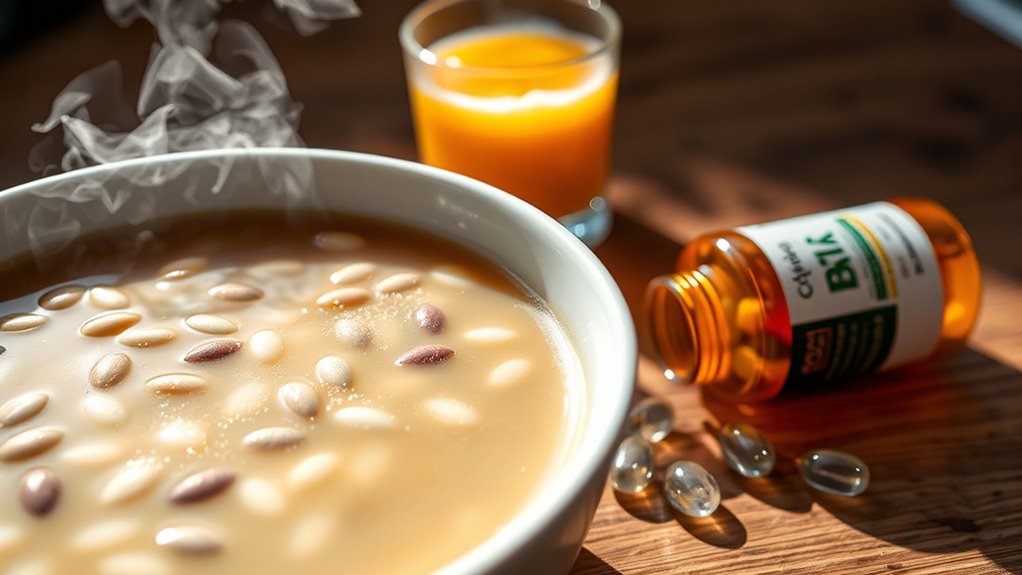
Although fermented soy products like tempeh and miso are often promoted as sources of vitamin B12, relying on them for your B12 needs presents significant challenges. The fermentation pitfalls mean B12 levels can vary widely depending on the specific process and strains used. Plus, not all fermented soy products contain sufficient B12 to meet daily requirements. Here are some reasons to be cautious:
- Inconsistent B12 content due to fermentation variability
- Limited B12 absorption from plant-based sources
- Risk of relying solely on soy alternatives that may not supply adequate B12
- Potential for false security, thinking fermented soy is enough when it’s not
Relying on fermented soy alone isn’t enough; supplementation or fortified foods are often necessary.
Ensuring Adequate B12 Levels: Strategies for Vegetarians and Vegans
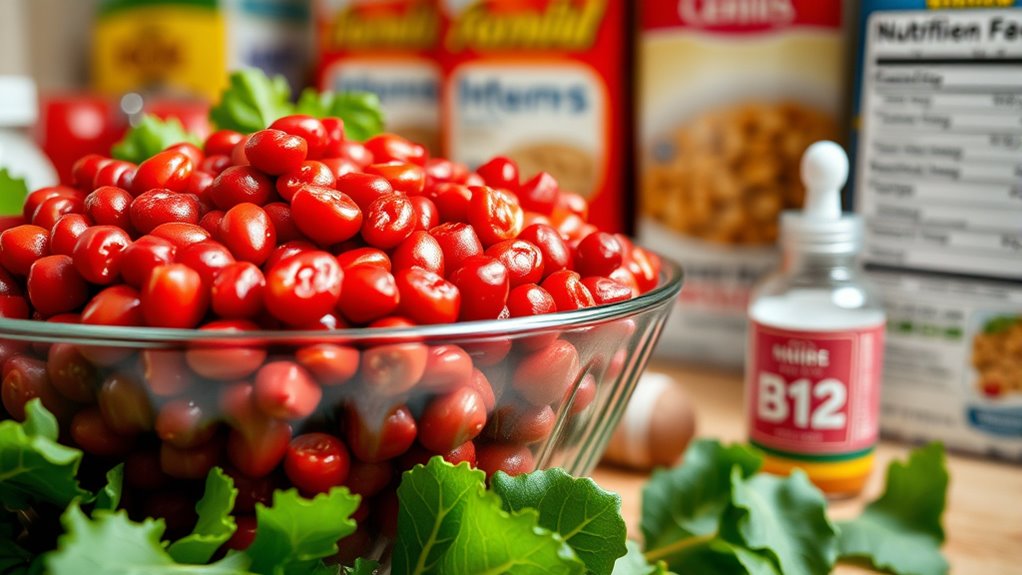
How can vegetarians and vegans guarantee they maintain adequate vitamin B12 levels? First, don’t fall for plant-based myths suggesting B12 is naturally abundant in plant foods. Relying solely on fermented soy or other plant sources often isn’t sufficient for ideal vegan health. Instead, consider fortified foods like plant-based milks, cereals, and nutritional yeast, which provide dependable B12. Supplements are also a safe, effective option to ensure you meet daily requirements. Regular B12 testing helps track your levels and prevent deficiency. Staying informed and proactive is essential, especially since B12 deficiency can lead to serious health issues. By combining fortified foods, supplements, and regular checkups, you can confidently maintain healthy B12 levels without compromising your vegan lifestyle.
Future Directions in B12 Fortification and Alternative Solutions
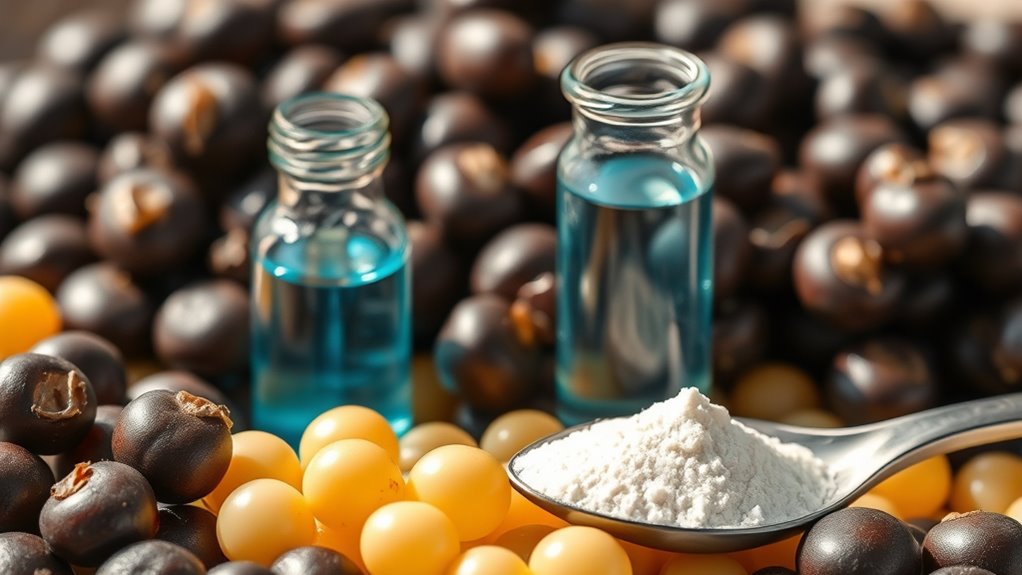
Innovations in B12 fortification and alternative solutions are shaping the future of maintaining adequate levels, especially as demand for sustainable and vegan options grows. Advances like genetic engineering allow scientists to develop bacteria that produce B12 more efficiently through microbial synthesis. This approach offers a promising, sustainable way to create B12 without animal sources. Here are some future directions:
- Using genetically modified microbes to boost B12 production.
- Developing plant-based fermentation processes for B12 enrichment.
- Exploring bioengineered foods that naturally contain B12.
- Improving stability and bioavailability of B12 in fortified products.
These innovations aim to create more reliable, eco-friendly, and accessible B12 sources, ensuring everyone, regardless of diet, can maintain healthy levels.
Frequently Asked Questions
Can B12 Deficiency Cause Long-Term Health Problems?
B12 deficiency can cause long-term health problems like neurological damage and cognitive decline if left untreated. You might experience memory issues, mood changes, or tingling sensations. It is crucial to address deficiency early, as ongoing lack of B12 leads to irreversible damage. Fortification and supplementation help prevent these issues, but relying solely on fermented soy isn’t enough. Staying aware of your B12 levels ensures your nervous system stays healthy and functioning properly.
Are There Risks Associated With B12 Over-Supplementation?
You might wonder if taking too much B12 poses risks. While toxicity concerns are rare because B12 is water-soluble, overdose symptoms like acne or skin reactions can occur with excessive intake. Generally, your body excretes unused B12, making overdose unlikely. However, if you supplement excessively over time, monitor for any unusual side effects. Consult a healthcare professional to ensure your B12 levels stay balanced and safe.
How Does B12 Absorption Differ Among Age Groups?
Imagine a 65-year-old woman struggling with low B12 levels despite eating fortified foods. Absorption differences become clear here, as age-related decline affects her ability to absorb B12 efficiently. Younger individuals typically absorb B12 well through the stomach’s intrinsic factor, but as you age, this process weakens, making absorption less effective. Understanding these age-related declines helps you tailor B12 intake strategies across different life stages.
Is Plant-Based B12 Supplementation Suitable for Children?
You might wonder if plant-based B12 supplementation is suitable for children. It can be, but you should prioritize reliable plant-based sources and consult your pediatrician to guarantee proper dosage. While supplementation safety is generally high when guided properly, children’s needs vary, so professional advice helps prevent deficiencies or excess. Always choose fortified foods or supplements specifically designed for children to support their growth and health effectively.
What Are Emerging Alternatives to Traditional B12 Fortification Methods?
This question is a game-changer in nutrition! Emerging alternatives like microbial fortification are revolutionizing B12 delivery, making it more natural and effective. These methods boost B12 bioavailability by using specially engineered microorganisms that produce the vitamin directly in foods or supplements. Unlike traditional fortification, microbial fortification guarantees better absorption, offering a sustainable and innovative solution for everyone, especially those on plant-based diets.
Conclusion
Think of vitamin B12 as the compass guiding your health through uncharted waters. Relying solely on fermented soy is like trusting a flickering lantern in the dark—it may not lead you safely home. By understanding how B12 is fortified and choosing reliable sources, you keep your inner compass steady, steering toward vitality. Don’t let the shadows of uncertainty dim your path—embrace proven solutions to stay on course.

